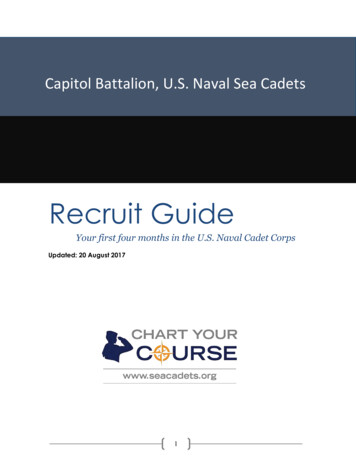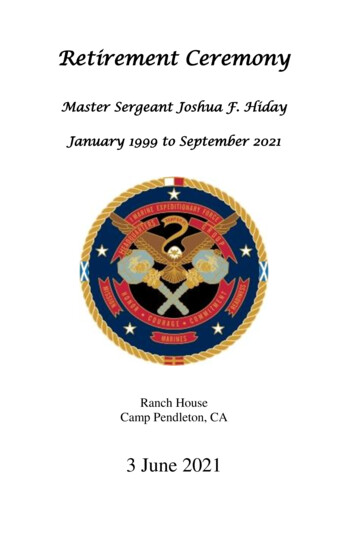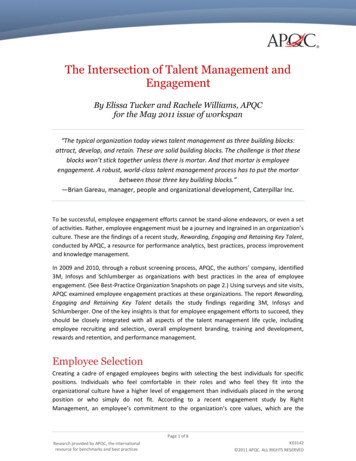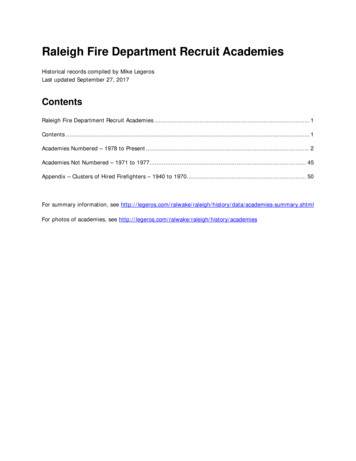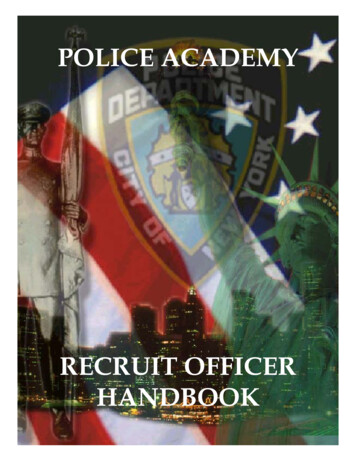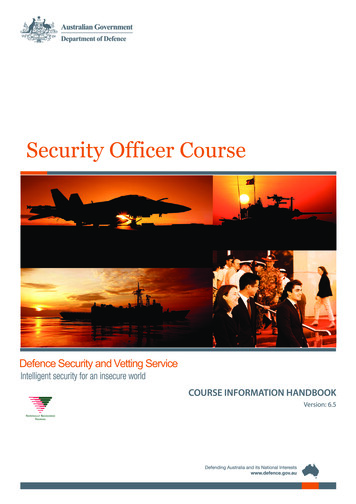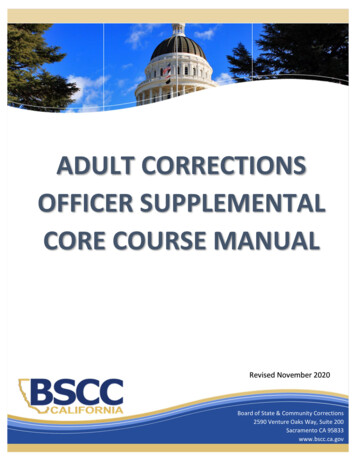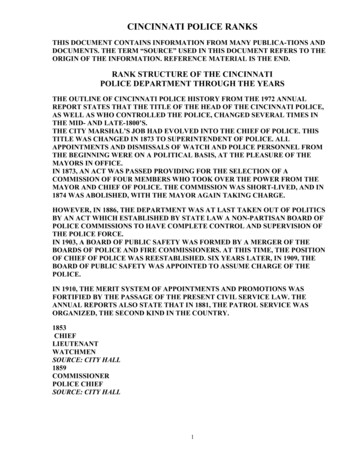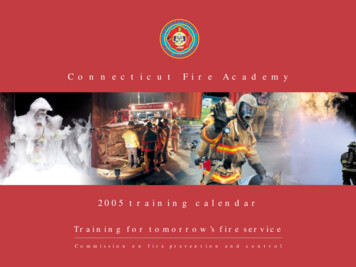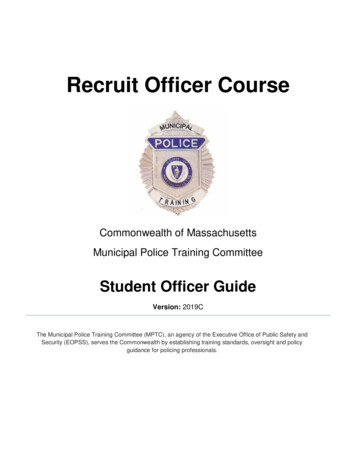
Transcription
Recruit Officer CourseCommonwealth of MassachusettsMunicipal Police Training CommitteeStudent Officer GuideVersion: 2019CThe Municipal Police Training Committee (MPTC), an agency of the Executive Office of Public Safety andSecurity (EOPSS), serves the Commonwealth by establishing training standards, oversight and policyguidance for policing professionals.
Student Officer GuideMessage from the Executive DirectorOn behalf of the entire Municipal Police Training Committee (MPTC) staff, it is my honorand privilege to welcome you to the police Academy. Congratulations for choosing a careerin policing. It is an exciting and rewarding profession. However, it is also challenging anddangerous. As a result, we at MPTC are committed to providing you with the best, up-todate training to give you the knowledge and skills you will need to be successful and safeduring your career.As you enter the academy, you are entering into a life-changing experience – one thatcan position you for great success in your career. However, the catalyst for that success isyou. You will largely get out of this training what you invest in it. I encourage you to utilizethis opportunity to learn, grow, and experience. If you do make mistakes during training,learn from them and become stronger.The basic recruit officer training is designed to produce an officer who is not onlycompetent at enforcing the law but who is also equally effective at solving problems. Thisnecessitates a combination of classroom and practical activities requiring you to apply thetheoretical and classroom portions of the training in actual real-world applications. Thecurriculum is also designed to inculcate the importance of personal and professionalintegrity as it incorporates ethical principles and decision making throughout the curriculum.You will find the training and the regimen demanding. This is by design. You areentering into a profession wherein society expects much. It expects unquestionableintegrity, professionalism, high self-discipline, initiative, dedication to serving the community,and excellence. The academy is designed to help you find those in yourself and to give youa chance to help your classmates discover it as well. We have high expectations for youand trust you will live up to them.Do not be afraid to ask for help. The academy, like police work, takes teamwork,collaboration, and support. It requires you to ask supervisors, coworkers, and thecommunity for their help and guidance. Ask questions. Help your classmates and allowthem to help you. At the same time, do not forget your most important supporters: yourfamily and your community. Take care of those relationships; they will not only be yoursupport during your training, they will be waiting for you when you graduate. Again,welcome to the Police Academy. We look forward to working with you during this trainingand throughout your police career.Very Sincerely,Daniel ZivkovichExecutive DirectorMunicipal Police Training CommitteeRecruit Officer CourseVersion: C20192 of 59
Student Officer GuideTable of ContentsSectionIIIContent / TopicThe AgencyThe Oversight BodyThe AcademyA. Core PrinciplesB. ValuesC. DiversityD. Learning EnvironmentE. Education & CurriculumF. Written & Skills TestingIIIG. HomeworkH. Structure & DisciplineI. Drill & CeremonyJ. Health & WellnessK. Physical Fitness TestingL. Loyalty to Profession & CommunityM. Family SupportN. GraduationIVCode of Massachusetts Regulations (CMR)MPTC Policies & ProceduresA. Recruit Training EnrollmentB. Recruit Uniforms & Personal AppearanceVC. Bias & Sexual HarassmentD. Recruit Training Performance CriteriaE. Recruit Training Standards of Conduct: Abstract of DelinquenciesF. Police Academy Dismissal & AppealsG. Reserve/Intermittent Training Program Dismissal & AppealsRecruit Officer CourseVersion: C20193 of 59
Student Officer GuideI.The AgencyThe Municipal Police Training Committee (MPTC) is the name of the stateagency statutorily tasked with implementing training standards for and deliveringtraining to the Commonwealth’s municipal, University of Massachusetts, andenvironmental police officers. In 1964, the Legislature passed the first generallaw requiring police officers in cities and towns with populations greater than5,000 to complete a basic entry-level training course.In 1968, an in-service training requirement was added for veteran officers. In1972, the Legislature eliminated the exemption for cities and towns withpopulations under 5,000 and added a requirement for supervisory training. Overthe years, MPTC responsibilities have expanded to include mandated training ontopics including, but not limited to sexual assaults, suicide prevention, and hatecrimes.MPTC has taken the lead role in relevant social issues. Drugs, domesticviolence, highway safety, civil rights, and community engagement are a few topicareas receiving special attention and effort.MPTC is responsible for the delivery of municipal police training in four (4) courseareas:II.A.In-service training for full-time and reserve/intermittent police officers.B.Specialized training courses which cover a single topic.C.Recruit Officer Course (ROC) for police officers.D.Basic training program for reserve/intermittent police officers.The Oversight BodyThe Municipal Police Training Committee, or “Committee”, is also the name ofthe 11-voting-member oversight body that provides policy guidance to the stateagency, the MPTC. The Committee meets monthly to establish trainingstandards, policies, curricula, philosophies, and exemptions, as well as to provideguidance to the MPTC staff. These meetings are open to the public.Recruit Officer CourseVersion: C20194 of 59
Student Officer GuideIII.The AcademyShared community policing values are the core of the ROC. Everything you do inthe academy should be guided by the principle that police are part of, not apartfrom the community. The view that policing is an “us vs. them” proposition iscontradictory to major goals of the policing profession and the academy. Thesegoals include, but are not limited to the following: A.building trustfinding creative solutions to problemsreducing crime, fear of crime and social disorderworking to prevent problems from occurring in the first placeCore PrinciplesThe ROC covers 21st Century Policing best practices with specificemphasis on the following core principles.B.1.Ethical decision making.2.Fair and impartial policing.3.Procedural justice.4.Problem solving.ValuesDuring the academy, student officers are presented with countlessscenarios that will help you define these values – your job is to apply themto the hundreds of choices you will have to make as a student officer andas a police officer after graduation. Your experiences and decisions willhelp you define and understand their true meaning, learn from youractions and mistakes, and in the process, enhance character. Withoutintegrity there is no trust. And without trust, there is no sense ofcommunity.Recruit Officer CourseVersion: C20195 of 59
Student Officer GuideC.DiversityThe academy structure requires substantial uniformity in appearance andbehavior. This uniformity helps the academy and individuals in theacademy function smoothly. However, within the framework of uniformitythere is incredible diversity of experience, points of view, ways of getting ajob done, life-style, religious beliefs, and political views. Life is diverse. It isa primary academy value to appreciate difference. Tolerating difference isnot enough. At the same time that the academy structure promotesuniformity, the academy structure promotes the recognition and value ofdifference. Uniformity and differences do not contradict each other; theycomplement each other.D.Learning EnvironmentIt is a goal of the academy to make the learning active, engaging, anduseful. Because you must problem-solve as a police officer, you mustlearn to problem solve in the academy. If talking to citizens is an importanttool, you will have to practice communication skills in the academy. Wefully expect that the learning environment will reflect the job you will beasked to do. All of the academy staff and all of the instructors are intendedto be mentors who teach and model the kind of person and kind of policeofficer you will want to be.E.Education & CurriculumWhile teaching the specific knowledge and skills required for the job, theacademy values a broad education. Use the academy to identify socialissues that interest you. Policing is about community and society. Plan tocontinue to study and learn formally in college or in-formally by readingand taking courses. Education creates a more well-rounded officer.More than 120 learning objectives are organized into lesson topics.Lessons topics are organized into three (I-III) volumes that take 700 hours to deliver.1.Volume I: Policing in MassachusettsVolume I provides recruits with standards of conduct and core skillsneeded for every Commonwealth police officer. Volume I includesthe following individual lessons.Recruit Officer CourseVersion: C20196 of 59
Student Officer Guide2.a)Who We Areb)Problem-solvingc)Communication Skillsd)Officer Wellnesse)First Aid & CPRf)Report Writingg)Constitutional LawVolume II: InvestigationsThe ability to conduct a complete and thorough investigation is acritical job skill for police officers. Volume II provides recruits withfoundational best practices for investigations (criminal or noncriminal). Volume II includes the following individual lessons andsub-topics:a)Interviews & Interrogationsb)Criminal InvestigationsIndividual sub-topics for “Criminal Investigations” lessonincludes, but is not limited to the following:oooooooRecruit Officer CourseVersion: C2019Crime Scenes & EvidenceCriminal LawDomestic Violence InvestigationsSexual Assault InvestigationsHuman / Sex TraffickingJuvenile InvestigationsMissing Persons7 of 59
Student Officer Guidec)Motor Vehicle InvestigationsIndividual sub-topics for “Motor Vehicle Investigations”lesson includes, but is not limited to the following:oooooo3.Motor Vehicle LawsTraffic Control & DirectionMotor Vehicle StopsO.U.I. InvestigationsCrash InvestigationsSpeed Measurement & DetectionVolume III: Patrol ProceduresVolume III covers frequent duties and critical tasks performed byuniform patrol officers. Individual sub-topics for Volume III includes,but is not limited to the followinga)Emergency Vehicle Operations Course (EVOC)b)Use of Forceooooc)Patrol DutiesoooooooRecruit Officer CourseVersion: C2019HandcuffingPersonal DefenseWeapons: OC & BatonWeapons: FirearmsOfficer SafetyCrime PreventionIncident Command SystemHazardous Material EmergenciesActive ShooterCrowd ManagementHomeland Security8 of 59
Student Officer GuideF.Written and Skills TestingMultiple written and skills test will be administered throughout the ROC toinclude the following:1.Knowledge: Recruit must recall specific pieces of information.2.Cognitive Skills: Recruit must organize, evaluate, and analyzeinformation when given facts (e.g., decision-making).3.Psychomotor Skills: Recruit must demonstrate a specific skill orcomplete an activity to identified competencyA final comprehensive exam will also be administered at the end ofthe Academy.G.HomeworkThe emphasis of homework is on studying and learning, completingprojects, and investing in community involvement. You will also need tocare for your equipment, personal hygiene, and uniforms. Develop aprocedure that allows this to be done quickly and routinely. It is alsoimportant to get adequate rest each night to allow you to deal with thestressors and demands of your training. Get the most value out of eachday you are at the academy. It is a once-in-a-life-time experience.H.Structure & DisciplineThe academy is structured by specific rules and regulations. Recruitofficers are expected to work within that structure and are heldaccountable for behavior. Some of these values are punctuality, goodhygiene and grooming, respect for others, diligence, perseverance,honesty, and open mindedness. Included in this manual are the completerules and regulations as well as policy. Stay within the structure! It isintended to prepare you to work within the structure of a policedepartment and to provide a safe and coordinated environment conduciveto learning for all participants.Recruit Officer CourseVersion: C20199 of 59
Student Officer GuideI.Drill & CeremonyDrill and ceremony training is a legitimate police activity. Drill andceremony is not policing’s link to the military nor is it an opportunity tocreate a combat unit.The primary purpose of drill & ceremony is to teach recruit officers a setof skills. Drill and ceremony training is an integral part of the MPTCAcademy because it helps accomplish the following:J.1.Creates structure.2.Promotes group identification, teamwork, and esprit de corps.3.Introduces tactical operations and prepares officers to move as aunit when needed.4.Instills “muscle memory” for physical skills and personal defensetraining.5.Cultivates command presence by emphasizing voice andappearance.6.Trains recruit officers to perform in community events, such asparades, funerals, flag ceremonies, and graduations.Health & WellnessThe ROC provides basic skills to help recruits lead a healthy lifestyle andachieve longevity with improved on-the-job performance. Instructors willhelp recruits develop personalized plans to promote lifetime wellnesshabits. This includes, but is not limited to the following:1.nutrition2.proper sleep & rest3.stress management4.maintain healthy weightRecruit Officer CourseVersion: C201910 of 59
Student Officer GuideK.5.disease and injury prevention6.physical fitness (see below)Physical Fitness TrainingThe Academy includes a variety of daily stretching, weight training,calisthenics, or aerobic activities. Physical fitness activities are designedto improve or enhance the following:1.flexibility2.aerobic & anaerobic capacity3.muscular strength & endurance4.motor / job skill performanceEvery recruit officer must fully participate in 70% of physical fitnesstraining sessions. Non-participation in more than 30% of physical trainingsessions will result in dismissal. The following are minimum fitnessstandards.Recruit Officer CourseVersion: C201911 of 59
Student Officer GuideRecruit Officer CourseVersion: C201912 of 59
Student Officer GuideNote: Review “Health & Wellness Preparation Guide” for information onhow to physically prepare for the Academy.L.Loyalty to ProfessionUpon entering an academy, most recruit officers have a perception of themeaning of the word loyalty. Loyalty is a value that most people hold inhigh esteem. While it is natural to develop close personal friendships andties with classmates, the academy believes that loyalty to the principles ofcommunity and integrity and to the police profession supersedes personalidentification with an individual or a graduating class. This is not todiminish the importance of developing friendships and feelings ofbelonging. But remember, it is your relationship to the community andyour loyalty to the citizens you serve, to the police profession, and to theprinciples of integrity that are among the highest values and will defineyou as an officer.Recruit Officer CourseVersion: C201913 of 59
Student Officer GuideM.Family SupportThe training course is long and demanding. You will need help andsupport. Remember, the people who are close to you and love you will beyour best support. Let them help you and thank them. They will be therefor you at graduation and as you embark upon your police career. Modernpolice work is a profession founded upon service, healing, and caring.Family and friends care about you. Don’t let your time at the academybecome so overwhelming that you forget to care about and for them.personal identification with an individual or a graduating class. This is notto diminish the importance of developing friendships and feelings ofbelonging. But remember, it is your relationship to the community andyour loyalty to the citizens you serve, to the police profession, and to theprinciples of integrity that are among the highest values and will defineyou as an officer.N.GraduationAcademy graduation is used to celebrate achievement in completing adifficult and challenging course and fulfilling a dream. Graduation is alsoused to confer authority and powers of a police officer. The graduationaudience serves as a witness and confirms the trust they place in you toaccept that authority and to do the job according to a set of sharedvalues.Graduation symbols, speeches, and mottos display a unifying vision - thatpolicing in a free and democratic society has as its goal the safety andimproved quality of life for every citizen.IV.Code of Massachusetts Regulations (CMR)Section 550 CMR 3.00 outlines all municipal police officer training requirements.A.3.01 - Purpose and Scope(1)Recruit Officer CourseVersion: C2019Purpose. In accordance with the provisions of M.G.L. Chapter30A, the Municipal Police Training Committee promulgates 550CMR 3.00 in furtherance of the M.G.L. 6 §116 and 41 §96Brequirements that full-time and part-time reserve/intermittent policeofficers, environmental law enforcement officers, and University ofMassachusetts police officers be assigned to and satisfactorily14 of 59
Student Officer Guidecomplete a course of study prescribed by the Municipal PoliceTraining Committee before exercising police powers.(2)B.Scope. 550 CMR 3.00 shall apply to all recruit training programsoperated or approved by the Committee pursuant to M.G.L. 6§118.3.02 - DefinitionsAcademy Director: A person tasked with overseeing and directing a policeacademy.Committee: The Municipal Police Training Committee (MPTC) or itsagency staff acting on its behalf, where applicable, or both.Executive Director: The executive director of the Municipal Police TrainingCommittee.Full-time Police Officer: A person who receives an appointment to apermanent full-time position in which he will exercise police powersas a police officer, environmental law enforcement officer, orUniversity of Massachusetts police officer.Police Academy: An entry-level academy operated or approved by theMunicipal Police Training Committee that has the prescribed course ofstudy that a full-time police officer must satisfactorily complete prior toexercising police powers in Massachusetts.Program Administrator: A person tasked with overseeing and directing areserve/intermittent training program.Recruit Training: All entry-level police academies and reserve intermittenttraining programs.Reserve/Intermittent Police Officer: A person who receives anappointment to a part-time reserve/intermittent position in which he or shewill exercise police powers as a police officer, environmental lawenforcement officer or University of Massachusetts police officer.Recruit Officer CourseVersion: C201915 of 59
Student Officer GuideReserve/Intermittent Training Program: An entry-level training programoperated or approved by the Municipal Police Training Committee thathas the prescribed course of study that a reserve/intermittent policeofficer must satisfactorily complete prior to exercising police powers inMassachusetts.Sponsored Candidate: A student officer who is not employed by a lawenforcement agency, either full-time or part-time, during his recruittraining.Sponsoring Administrator: For a police academy, the sponsoringadministrator must be the chief of a municipal or University ofMassachusetts police department or the colonel of the MassachusettsEnvironmental Police who sponsors a student officer to attend recruittraining. For a reserve/intermittent training program, the sponsoringadministrator is the head of any Commonwealth law enforcement agencywho sponsors a student officer to attend a reserve/intermittent trainingprogram.Sponsoring Department: A law enforcement agency sending a candidateto recruit training who is not employed either fulltime or part-time by theagency.Student Officer: Person attending recruit training commencing on the firstday of the training and continuing through graduation.C.3.03 - Entry Level Training; Exemptions, Waivers, Expirations(1)Full-time Police Officers. Unless specifically exempted ortemporarily waived by majority vote of the Committee, everyperson appointed as a full-time police officer shall, prior toexercising police powers, be assigned to and satisfactorilycomplete a police academy. In keeping with M.G.L. 41 § 96B,no person appointed as a fulltime officer for whom an exemptionhas been requested shall exercise police powers until such time asthe exemption is granted.(a)Recruit Officer CourseVersion: C2019Exemption from the Police Academy Training Requirement.Upon petition to the Committee by an officer's employingdepartment, a person appointed to serve as a full-time16 of 59
Student Officer Guidepolice officer in Massachusetts may be granted anexemption from the police academy training requirement incertain limited circumstances. Said exemption must berequested and granted prior to the fulltime officer exercisingpolice powers. To qualify for such an exemption, theemploying department shall provide to the Committeedocumentation of the officer's successful completion oftraining that is substantially equivalent to or greater thanthat of a Massachusetts police officer at a comparable levelof experience, including a record of the entry- level policeacademy the officer attended and the curriculum at the timeof at-attendance; all in-service, specialized and othertraining courses completed by the officer; anddocumentation that the officer has obtained a minimum oftwo years of full-time law enforcement experience sincecompletion of the entry-level police academy. Any persongranted an exemption pursuant to this subsection mustthereafter successfully complete the Massachusetts PoliceOfficer Orientation Training Program approved by theCommittee. The officer shall complete such orientationprogram within 90 days after the exemption is granted.Failure to complete such orientation within 90 days will voidthe ex-emption and the fulltime officer’s ability to exercisepolice powers until such time as the officer meets trainingrequirements or otherwise is granted an exemption fromentry-level training requirements. In the event of a voidedexemption, the employing department may reapply for anexemption, which must be requested and granted priorto the full-time officer exercising police powers.(b)Recruit Officer CourseVersion: C2019Temporary Waiver from the Police Academy TrainingRequirement. In the event of a documented public safetyemergency or other exigent circumstance, a personappointed to serve as a full-time police officer inMassachusetts may be granted a temporary training waiverfor a period not to exceed 270 days. Said waiver must berequested and granted prior to the officer exercising policepowers in a fulltime capacity. To qualify for such a waiver,the employing department shall provide documentation ofthe officer's current certification in first-aid andcardiopulmonary resuscitation (CPR) pursuant to M.G.L.17 of 59
Student Officer Guide111 §201; current qualification in the use of firearms ascertified by a Committee- approved firearms instructor;successful completion of the re-serve/intermittenttraining program, and documentation that the officer hasobtained a minimum of one year of law enforcementexperience since completion of the reserve/intermittenttraining program. During the 270- day waiver period, theofficer must become enrolled in and commence attendanceat a police academy.(c)Petitions for Exemptions and Waivers. Employingdepartments shall forward letters of request and applicabledocumentation, as determined by the Commit-tee, to theCommittee, or its designee, for approval. Employingdepartments will be notified, in writing, within 30 daysfollowing the Committee's decision.(2)Reserve/Intermittent Police Officers. Each person appointed as are-serve/intermittent police officer in a city or town shall, prior toexercising police powers, satisfactorily complete a reserve /intermittent training program prescribed by the Committee. M.G.L.41§96B does not authorize any exemptions or waivers from thistraining requirement.(3)Upon graduation from a police academy or a reserve / intermittenttraining program, any student officer who does not becomeemployed as a police officer within two years must re-attend theapplicable police academy or reserve/intermittent training programprior to exercising police powers. A student officer who does notbecome employed within the two-year requirement due to amilitary activation may apply to the Committee to waive thisrequirement, subject to the training requirements in550 CMR 3 .04.(4)As stated in M.G.L. 41 §96B, failure of a person appointed as apolice officer to comply with the provisions of550 CMR 3 .03(4) tohis or her exercising police powers, shall result in the appointedperson's removal by the appointing authority, provided said personhas not been exempted therefrom by the Committee as provided in550 CMR 3.03(4). Failure of an appointed person to satisfactorilyRecruit Officer CourseVersion: C201918 of 59
Student Officer Guidecomplete the prescribed course of study may result in his removalby the appointing authority.D.3.04 - Training Requirements After Interruption in Police ServiceOfficers Exercising Police Powers After an Interruption in Service. Anyfull-time police officer or reserve/intermittent police officer who hasundergone an interruption in police service of one or more years duringwhich the officer has not exercised police powers substantially equivalentwith those of a Massachusetts police officer at a comparable level ofexperience shall conform to the following training standards prior to onceagain exercising police powers:(1)(2)(3)Interruptions of One to Two Years.(a)Compliance with M.G.L. c. 111, § 201 (first-aid and CPR);(b)Qualification in firearms by Committee-approved firearmsinstructor; and(c)Completion within 90 days after the interruption in serviceends, shall of the current annual in-service training approvedby the Committee.Interruptions of More Than Two Years and Less Than Five Years(a)Compliance with 550 CMR 3.04(l)(a) through (c);(b)Completion within 90 days after the interruption in serviceends, of all MPTC in-service legal update classes and examsnot taken and passed during the period of interruption; and(c)Completion of any additional training required by theemploying/sponsoring department, including but not limitedto field training programs.Interruptions of Five or More YearsCompletion of a police academy for full-time police officers, or areserve/intermittent training program for reserve/intermittent policeofficers, subject to emplo yment a n d compliance withRecruit Officer CourseVersion: C201919 of 59
Student Officer Guideadmission requirements, or, in the discretion of theCommittee, completion of alternative training requirements set forthby the Committee.E.F.3.05 - Recruit Training: Policies and Procedures(1)Sub-regulatory Policies and Procedures. The Committee mayestablish sub- regulatory policies and procedures provided they donot contravene 550 CMR 3.00. Police academies andreserve/intermittent training programs have the authority toestablish such sub-regulatory policies and procedures as aredeemed necessary for the effective and efficient operation of therecruit training, provided they do not contravene 550 CMR 3.00 orapplicable sub-regulatory policies, procedures, rules andregulations established by the Committee. Sub-regulatory policiesand procedures must be approved in writing by the executivedirector or his or her designee prior to the start of recruit training.(2)Concurrent Authority. A student officer is subject to the policies,procedures, rules and regulations of the employing/sponsoringdepartment, the Committee, and the recruit training in which thestudent officer is enrolled. When determining the applicability ofone set of policies, procedures, rules or regulations versusanother, the stricter standard shall always apply.(3)Dissemination. Each student officer shall be provided with a copyof 550. CMR 3.00, applicable Committee sub-regulatory policies,procedures, rules and regulations, and any other applicable recruittraining sub regulatory policies and procedures establishedpursuant to 550 CMR 3.05(1). A properly executed Statement ofCompliance, signed by both the student officer and the chiefexecutive officer of the employing/sponsoring department, must besubmitted as part of the enrollment process.3.06 - Recruit Training: EnrollmentPolice Academy Enrollment. Candidates accepted into a police academymust be a minimum of 21-years old and employed or sponsored by amunicipal, environmental, or University of Massachusetts policedepartment or, if authorized by the Committee, some other lawenforcement department. All candidates must successfully complete theRecruit Officer CourseVersion: C201920 of 59
Student Officer GuideMassachusetts Human Resource Division's Physical Ability Test (PAT)and medical examinations within six months prior to the start of a policeacademy and any other standards established by the Committee. Allissues of civil liability shall be determined in accordance with M.G.L.Chapter 258 and other applicable law. Sponsored candidates shall alsosign and comply with the terms of the academy's Waiver and Releaseform.Reserve/Intermittent Training Program Enrollment. Candidates acceptedinto a reserve/ intermittent training program must be a minimum of 18years old and employed or sponsored by a municipal, environmental, orUniversity of Massachusetts police department or, if authorized by theCommittee, some other law enforcement department. All issues of civilliability shall be determined in accordance with M.G.L. Chapter 258 andother applicable law. Sponsored candidates shall also sign and complywith the terms of the training
MPTC is responsible for the delivery of municipal police training in four (4) course areas: A. In-service training for full-time and reserve/intermittent police officers. B. Specialized training courses which cover a single topic. C. Recruit Officer Course (ROC) for police officers. D. Basic training program for reserve/intermittent police .

